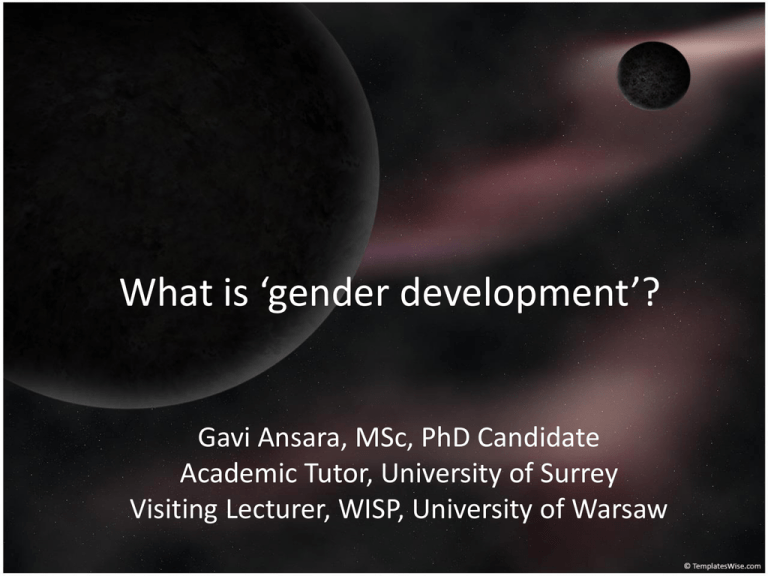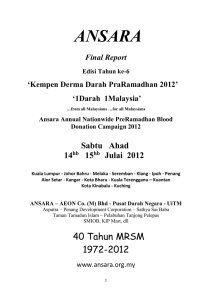
What is ‘gender development’?
Gavi Ansara, MSc, PhD Candidate
Academic Tutor, University of Surrey
Visiting Lecturer, WISP, University of Warsaw
Questions about
‘gender development’
• What do we think we know?
• What do we actually know?
• What are the implications of our ideas?
Sigmund Freud
•Three essays on the theory of sexuality
•1st edition in 1905, 6th edition in 1925
Sigmund Freud (1856-1939)
•Austrian neurologist
•Founder of Psychoanalysis
•Gender identity and role
development acquired
during phallic stage
•Libido based in genitals
from phallic stage
•Girls and boys start to
become distinct
Sigmund Freud
•Oedipal Complex
•Castration Anxiety
•Penis Envy
Carl Jung (1875-1961)
•Swiss psychiatrist who was
initially influenced by Freud
(~1900-1913)
•Founder of Analytical or
Jungian psychology
•Proposed the neo-Freudian
term ‘Electra Complex’ for girls
(1913)
Lawrence Kohlberg (1927-1987)
•Stage theory influenced by
Piaget’s cognitive
developmental theory
•Children make cognitive
judgements about gender
•Children use gender as an
organising principle for
social rules
•These social rules
determine children’s
behaviour
Lawrence Kohlberg (1966)
•Gender identity: ‘children
can correctly identify their
sex’ (~ 2 yrs)
•Gender stability: ‘children
know that gender remains the
same over time’ (~ 4 yrs)
•Gender constancy: ‘children
know gender is not changed
by appearance’ (~ 7 yrs)
Albert Bandura (1925-present)
•Social learning theory (1986)
•Gender identity and role are
a set of behaviours learned
from a child’s environment
•Gender behaviours are
learned through observational
learning
Albert Bandura (1986)
•Bandura’s social learning
theory applied to gender
development:
•Imitation
•Modelling
•Reinforcement
•Identification
Sandra Bem (1944-present)
•Bem Sex Role Inventory
(BSRI) (versions from
~1971-1981)
•Gender schema theory
(1981) explanation for
gender stereotypes
•The Lenses of Gender
(1993)
Sandra Bem (1981)
•Gender schema theory
merges cognitivedevelopmental and sociallearning approaches
•Schemas: internal cognitive
networks shaped by
socialisation
•Schemas associated with
‘masculine’ and ‘feminine’
guide and organise our
perceptions
Sandra Bem
•BSRI (1972)
Sandra Bem (1993)
•Enculturated Lens Theory
(1993)
•Lenses that influence
everyday experiences of
gender:
•Biological essentialism
•Androcentrism
•Gender polarisation
What do you think you see?
What you’re actually viewing
Magdalena
Ventura
breastfeeding her
baby beside her
husband Felici in
José de Ribera’s
La Mujer Barbuda
(1631)
What we actually know
What we think we know
Are women and men ‘opposites’?
Are women and men ‘opposites’?
Lactating man, “Emblematic Figures”, Giulio Romano, 1499-1546
Is gender binary?
Is gender binary?
Film still from The Last Bissu (INDON, Globions, 2005)
Are ‘gender differences’ biological?
Are ‘gender differences’ biological?
Mr B Wijeratne breastfeeding his 18 month old daughter
after his wife died, Sri Lanka
Is gender fixed?
Is gender fixed?
Wairarapa MP Georgina Beyer, New Zealand
Is gender universal?
Is gender universal?
Gélédé dancers, Yorubaland, Nigeria
Are there essential ‘truths’ about
gender?
Universal or essential ‘truths’
about gender?
• There are more than two possible genders
• Some people have multiple genders, while
others do not identify as any gender
• There are diverse ways to determine gender
• In societies that assign gender, the state often
ignores people’s own gender
Universal or essential ‘truths’
about gender?
• There are few universal gender differences
and many more gender similarities
• Gender does not map neatly onto biology and
can change throughout the life span
• Ideas about gender have political significance
and affect people’s everyday lives
What are the implications?
Do we know our past?
Aeta hunter (Okinawa Soba, 2009)
Do we understand our present?
Olympic gold medalist weightlifter Prapawadee Jaroenrattanatarakoon
(AP, 2008)
Who has the right to gender?
Charlotte Karlsdotter in front of Swedish Parliament
(Image copyright Volcano & Dahl, 2008)
What is gender equality?
South African world athletic champion Caster Semenya
(Images from Wikimedia Commons)
What are our possibilities?
Proud father Thomas Beatie during his second pregnancy, pictured with his
wife Nancy and their daughter Susan (Mirror.co.uk, 2009)
So what do we know about
‘gender development’?
What do we know?
“It’s okay to be different because it just matters
who you are. It doesn’t matter if you’re different
than anybody else. It just matters if you’re having
a good time and you like who you are.” -Jazz
What do we know?
"Courage is the road to
freedom.
I woke up in complete
freedom today.
The sky is wide open."
-Balian Buschbaum
World record-holding German pole vaulter Balian Buschbaum
What do we know?
What do you think?
What do you think?
•Gender identity: ‘children
can correctly identify their
sex’ (~ 2 yrs)
•Gender stability: ‘children
know that gender remains the
same over time’ (~ 4 yrs)
•Gender constancy: ‘children
know gender is not changed
by appearance’ (~ 7 yrs)
What do you think?
Gender development:
•Imitation
•Modelling
•Reinforcement
•Identification
What do you think?
What we actually know
What we think we know
Discussion Questions
1) What do Ansara and Hegarty's (2011)
findings suggest about research claims about
gender development?
2) Which problems do Ansara and Hegarty
identify in existing literature on gender
development?
Discussion Questions
3) What are Ansara and Hegarty's suggestions
for addressing these problems?
4) How do Ansara and Hegarty's findings affect
your evaluation of theories, methods, and
practices related to gender development?











